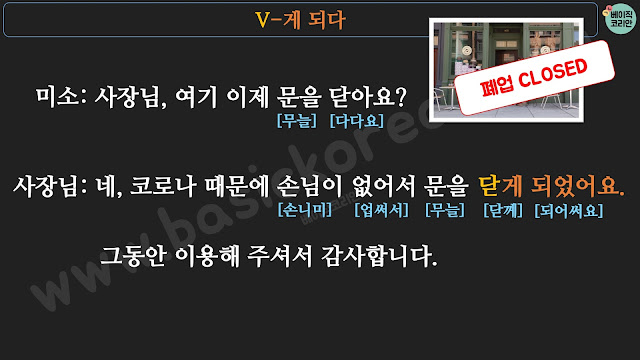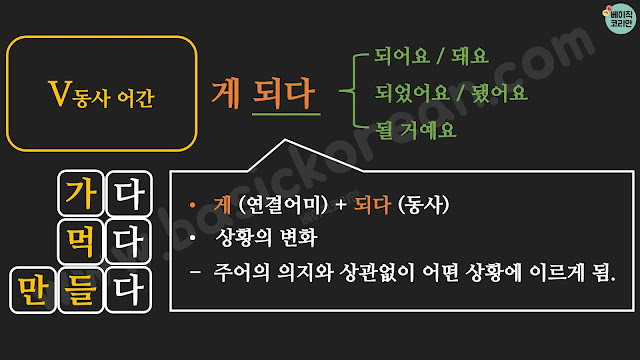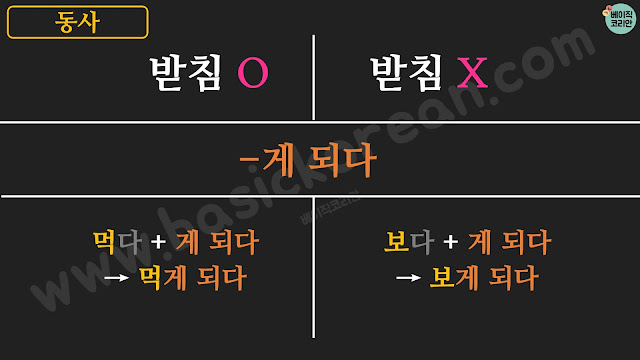Learn Korean: Korean Grammar 117: V-게 되다
In this lesson, we're going to learn 'V-게 되다'
손님이 없어서 문을 닫게 되었어요.
If you want to watch the lesson in Korean with English subtitles, please click the link below.
🎬 Korean Grammar 117: https://youtu.be/Z283gnn_EEA
1. A short conversation & Pronunciation
- 미소: 사장님, 여기 이제 문을 닫아요?
(Sir, do you close down the cafe?)
(Sir, do you close down the cafe?)
- 사장님: 네, 코로나 때문에 손님이 없어서 문을 닫게 되었어요.
(Yes, because of COVID-19, I was forced to close down the shop as there were no customers.)
(Yes, because of COVID-19, I was forced to close down the shop as there were no customers.)
그동안 이용해 주셔서 감사합니다.
(Thank you for using it in a meantime.)
The grammar we're going to learn today is '닫게 되었어요.'
2. Usage
► '-게 되다' attaches after a verb stem.
► It is an expression that combines the verb '되다' after the connecting ending '게.'
► This expression is used when talking about a change in a situation.
► The expressions you learn in this class are used to indicate that you will reach a certain situation regardless of the will of the subject.
► And the verb ‘되다’ is conjugated in
- the present form - '되어요, and short-form '돼요'.
- the present form - '되어요, and short-form '돼요'.
- the past form - '되었어요', and short-form '됐어요'
- the future form - '될 거예요'.
- the future form - '될 거예요'.
3. Example Sentences
✎ 손님이 없어서 문을 닫게 되었어요. (닫다 + 게 되다)
(The shop is closed down because there were no customers.)
(The shop is closed down because there were no customers.)
- '닫게 되었어요' is a combination of the verb '닫다' and '-게 되다'
- I run a cafe. There were many customers. However, there are no customers due to COVID-19. So I close down the shop. Regardless of the speaker's will, the cafe is closed down.
- I run a cafe. There were many customers. However, there are no customers due to COVID-19. So I close down the shop. Regardless of the speaker's will, the cafe is closed down.
- Like this, when a situation happens regardless of one's will, you can say using '-게 되다' after the verb '닫다.'
✎ 팔을 다쳐서 산에 못 가게 되었어요. (가다 + 게 되다)
(I hurt my arm so I couldn't go to the mountain.)
(I hurt my arm so I couldn't go to the mountain.)
- Here, '가게 되었어요' is a combination of the verb '가다' and '-게 되다.'
- I was going to the mountain. But I hurt my arm. So I can't go to the mountain.
- I was going to the mountain. But I hurt my arm. So I can't go to the mountain.
- Like this, when a situation happens regardless of one's will, you can say using '-게 되다' after the verb '가다.'
4. Combination Information
- It attaches after a verb stem.
- Whether a verb stem has the final consonant or not, '-게 되다' is used for both cases.
1) Final Consonant O & X: -게 되다
- Final Consonant O: 먹다 + 게 되다 → 먹게 되다
- Final ConsonantX: 보다 + 게 되다 → 보게 되다
5. Practice
- 차가 밀려서 지각을 하게 됐어요. (하다 + 게 되다)
(I got late because of the traffic jam.)
(I got late because of the traffic jam.)
- 머리가 아파서 병원에 오게 됐어요. (오다 + 게 되다)
(I came to the hospital because I had a headache.)
(I came to the hospital because I had a headache.)
- 취직을 해서 서울에 2년 동안 살게 됐어요. (살다 + 게 되다)
(I got a job and lived in Seoul for 2 years.)
(I got a job and lived in Seoul for 2 years.)
- 나나: 미소 씨, 지안 씨 생일 파티에 올 수 있어요?
(Miso, can you come to Jian's birthday party?)
(Miso, can you come to Jian's birthday party?)
- 미소: 미안해요. 갑자기 일이 생겨서 못 가게 될 것 같아요.
(Sorry. I don't think I can go because something suddenly happened.)
(Sorry. I don't think I can go because something suddenly happened.)
- 나나: 아, 그래요? 그럼, 혹시라도 올 수 있으면 연락 주세요.
(Oh yeah? Then, if you can come, please let me know.)
(Oh yeah? Then, if you can come, please let me know.)
→ 가게 될 것 같아요: 가다 + 게 되다 + ㄹ 것 같다
Thank you~!
#베이직코리안 #한국어문법 #Basickorean #Koreangrammar #게되다






_basickorean.jpg)

